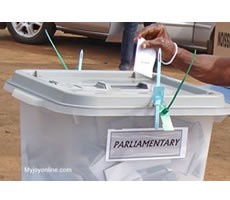Accra, Dec. 4, GNA - Voting in the Presidential and Parliamentary Elections on Tuesday December 7 would be between 0700 hours and 1700 hours and the entire process would take place in the open view of the public, the Electoral Commission (EC) stated on Saturday.
Dr Kwadwo Afari-Gyan, EC Chairman, told the Ghana News Agency that party or agents of candidates would be allowed at polling stations to observe proceedings.
Presiding Officers in charge of polling stations would inspect the ballot papers in the presence of the agents, enter the total number, show the ballot boxes to the public to ascertain that they are empty and then place them in the open for voting.
Dr Afari-Gyan said a ballot paper would bear the names of candidates, parties and symbols for voting in secret, even though in the open. He said every voter in the queue at the polling stations at the close of polls at 1700 hours would be allowed to vote. Counting of ballot cast would start immediately after the last voter had cast his or her vote. He said the Presiding Officer might extend the voting period if circumstances prevented the start of the polls at exactly 0700 hours. At the close of poll, the Presiding Officer would open the ballot box in the presence of party agents and any other persons who would wish to witness the counting from a reasonable distance.
Dr Afari-Gyan said the Presiding Officer would sort out ballots cast in favour of each candidate, count them one by one to the hearing of those present and once everybody was satisfied, record it on the Result Form. The Presiding Officer would sign the form while the agents certified that the results were correct.
The Presiding Officer would then publicly announce the results and signed copies would be given to the party or candidate agent.
"It is to be noted that, once the results of a polling station have been certified in this way, the ballot papers are not counted again anywhere," Dr Afari-Gyan said.
He said, even though, each polling station would declare its own results, "the overall winner of the election for the constituency is not known until results from all polling stations within it have been added up".
Each Presiding Officer submits a copy of the Result Form to the Returning Officer at the Constituency Centre for collation in the presence of the candidates or their agents.
The EC Chairman said Returning Officers would sign the Result Form and the candidates or their agents would counter-sign after which he would publicly announce the result and declare the winner for the constituency for both the Presidential and Parliamentary elections. He said: "It should be noted that the declaration of a winner for the Parliamentary Election at the Constituency Centre ends it, provided there is no dispute."
However, the results are transmitted through the EC Regional Director to the Head Office in Accra for gazetting. Dr Afari-Gyan said in the case of the Presidential Vote, the whole country was considered as a constituency, all the votes cast in the various constituencies would have to be added up before a winner could be declared.
He said the EC Regional Directors in the presence of candidates or their agents add up the scores from each constituency to determine the overall winner for the Regions.
The regional and constituency results are sent to the EC Head Office and added up for the declaration of the national winner by the Chairman of the Commission, who is the Returning Officer for the Presidential Election.
The process leading to the declaration of the final results of the Presidential and Parliamentary are thoroughly decentralised and transparent.
"The voting pattern is transparent and at each point of the voting process, there is an identifiable glaring system, which would make it impossible for any one to cheat.
"The result of any polling station, where the number of votes cast would exceed the number of registered voters would be cancelled," he said.
Dr Afari-Gyan urged Ghanaians to avoid making wild allegations about imagined electoral fraud and suspicions, because one could not get things done in his favour.
He condemned those who falsely believed the elections would be rigged and said people made pronouncements that tended to erode confidence in an elaborate electoral system.
"Most of the time we talk about rights without talking about our duties and responsibilities and then fail to understand and appreciate how the electoral system operates," the Electoral Commissioner said.
Dr Afari-Gyan said electoral laws were not made on political platforms and that anyone who was unsatisfied with any part of the Electoral Law should go to court.
He said some people were in the habit of fabricating cock and bull stories anytime they were unable to have their way.
General News of Saturday, 4 December 2004
Source: GNA
EC outlines voting process

















